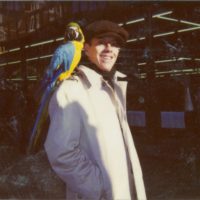The subject of memory comes up a lot in my reading. Cognitive science; philosophy; Buddhism and Taoism. Eventually they all get around to talking about the sense of self. That feeling of “I” that almost everyone experiences. Memory seems to be the glue that holds the self together throughout the years. I few nights ago I was reminded there are two types of memory (perhaps more, but two that I’m aware of).
I was going to call the first — and most common — “real memory.” But memories don’t seem as real to me as they once did. I considered “Memories of Stuff that Probably Happened,” but that’s a mouthful. Let’s call these Accessible Memories. I’m sure people who study this kind of stuff have a name for these, I just don’t know what it is.
Accessible Memories are of people, places, things that (probably) existed or happened in your past. I call them “accessible” because you can “go back” and retrieve them. Let’s say someone you work with mentions taking her son to Little League practice. If you played you probably have memories and you can intentionally retrieve some of them. In my experience, it’s usually the same ones. Perhaps because they’re good memories… or bad memories. In my experience, the longer I spend thinking about that time in my life, the more memories I can access. But my sense is there is a finite number of memories. Perhaps with drugs or hypnosis I could recall all of my memories but that’s another topic. But for whatever reason, I have a strong sense these memories are of stuff that happened.
 Let’s talk about dreams for a moment. Most of my dreams involve people and places from my past. As well as events that, though distorted and warped, have some basis in experience. But every so often I’ll have a dream that features totally unfamiliar elements, involving people/places/events that were never part of my waking life. Where did those images come from? Creepier still, one of these “made up” dreams might reoccur months or years later.
Let’s talk about dreams for a moment. Most of my dreams involve people and places from my past. As well as events that, though distorted and warped, have some basis in experience. But every so often I’ll have a dream that features totally unfamiliar elements, involving people/places/events that were never part of my waking life. Where did those images come from? Creepier still, one of these “made up” dreams might reoccur months or years later.
I’m aware of these “made up” dreams because I remember them. Sometimes upon awakening. Sometimes days later, “out of the blue” as it were. This is the other type of memory that I find so mysterious. Can one have a memory of something that never happened. Not just an inaccurate memory where you get some of the details wrong. But of something completely… imaginary? But that’s not right. The dream did happen. And I’m having a memory of that dream. Are dreams and memories completely different phenomenon? Can I dream about a memory? Why not?
Since I can have a memory of a dream (based on experiences), why not a memory of a dream featuring people that never existed and stuff that never happened? It feels like I’m conflating dreams and memories and they’re probably two different but related experiences. But these memories-of-dreams-of-stuff-that-never-happened fascinate me. And make my head hurt. (I keep looking for Leonardo DiCaprio’s little top from the movie Inception.)
Memories and dreams are “head stuff.” That’s the only place they happen (I know, I know. That’s the only place everything happens). So they feel less real to me than, say, the breath I’m taking at this moment. I can reach into wherever memories are kept and paw through them like a shoebox full of old photos… I can’t go digging around for a favorite dream. They’re mostly gone. For good reasons, I’m told. But once in awhile one “pops into our heads.” A memory, but always fleeting. Perhaps dreams-of-stuff-that-never-happened (DOSTNH) belong to someone else and got caught in a cosmic consciousness riptide before drifting over to one of my dreams.

 Thirty years ago Barb and I went to New York with another couple. It was miserably cold and I remember almost nothing of that weekend. I have a photo of me with a parrot sitting on my shoulder. That must have happened but I’m not sure if I have a memory of the experience or if the photo somehow created that memory.
Thirty years ago Barb and I went to New York with another couple. It was miserably cold and I remember almost nothing of that weekend. I have a photo of me with a parrot sitting on my shoulder. That must have happened but I’m not sure if I have a memory of the experience or if the photo somehow created that memory.

 : “In his seminal work, Flow: The Psychology of Optimal Experience, Csíkszentmihályi outlines his theory that people are happiest when they are in a state of flow—a state of concentration or complete absorption with the activity at hand and the situation. It is a state in which people are so involved in an activity that nothing else seems to matter. The idea of flow is identical to the feeling of being in the zone or in the groove. The flow state is an optimal state of intrinsic motivation, where the person is fully immersed in what he is doing. This is a feeling everyone has at times, characterized by a feeling of great absorption, engagement, fulfillment, and skill—and during which temporal concerns (time, food, ego-self, etc.) are typically ignored.”
: “In his seminal work, Flow: The Psychology of Optimal Experience, Csíkszentmihályi outlines his theory that people are happiest when they are in a state of flow—a state of concentration or complete absorption with the activity at hand and the situation. It is a state in which people are so involved in an activity that nothing else seems to matter. The idea of flow is identical to the feeling of being in the zone or in the groove. The flow state is an optimal state of intrinsic motivation, where the person is fully immersed in what he is doing. This is a feeling everyone has at times, characterized by a feeling of great absorption, engagement, fulfillment, and skill—and during which temporal concerns (time, food, ego-self, etc.) are typically ignored.”